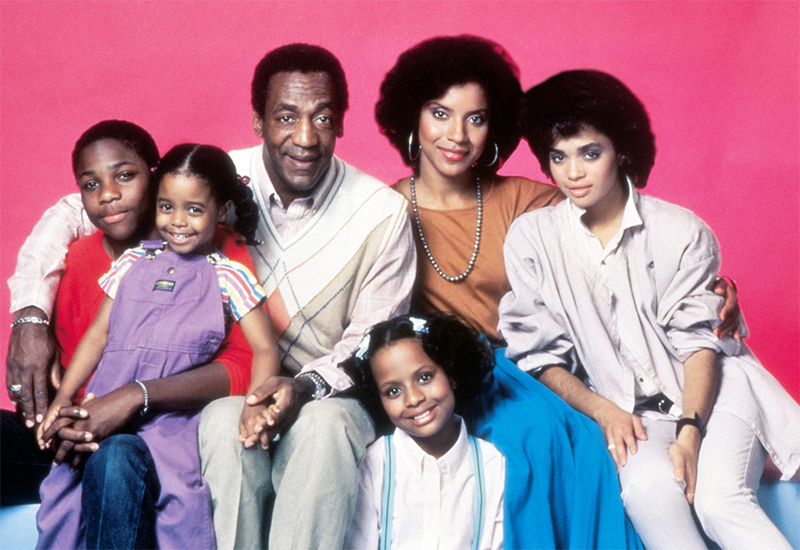We’ll never know what really happened became a common refrain earlier this year when allegations against Woody Allen returned to public conversation. Roxanne Gay wrote about the culture of compartmentalization that occurs in cases like this—when an artist and their art are scrutinized after accusations of monstrous crimes—and said, “I know I would rather stand where I stand and eventually be proven wrong than support Woody Allen and eventually be proven wrong.”
I can’t see a Woody Allen movie without thinking about the letter Dylan Farrow wrote in February about the abuse and trauma her father inflicted on her. But I never liked Annie Hall to begin with, so it wasn’t a beloved piece of art that had to be thrown on the fire.
But I love the Cosby Show. I loved it as a kid, when I was roughly the same age as Rudy. I love it as a grown-up when the marriage of Cliff and Clair Huxtable is an aspirational example of two fully-formed, independent professionals who love each other and work together as partners and parents. The Huxtables are a fictional family, sure, but since when does fictional mean we can’t aspire to it?
That’s why the idea of Bill Cosby as a rapist is hard to deal with. The Huxtables—Cliff and Clair especially—were willfully and explicitly role models, to African-American families and to every American family. Cliff’s relationship with his wife is the gravitational center of the Cosby Show.
A society’s—or a television fan’s—discomfort and disappointment when Bill Cosby the artist lets them down is nowhere near equal to the decades-long trauma and pain experienced by any of the women who were assaulted, violated, and bullied into silence by Bill Cosby the man. But it’s the legacy of that artist that protects the man. No one wants to live in a world where Bill Cosby does this. Where he gets away with it for almost 50 years.
These accusations have been public knowledge for nearly a decade, but we’ve continued to give Cliff Huxtable preference over actual women who were betrayed and assaulted.
I have a dear friend who grew up on the East Coast, and therefore loves Bruce Springsteen (spoiler alert—this is not a story revealing Bruce Springsteen as a monster). She remembers being 13 and going to a Springsteen concert, in the front row, and wearing her most-scandalous-at-thirteen outfit, hoping the Boss would notice her. Now, as an adult, she thinks about how terrible it would have been if Springsteen had noticed her. How terrible it would have been if he had even done a double-take in her general direction. He was a rock star, an idol, an icon—he was an artist she loved and admired. And if he’d noticed her thirteen-year-old self, with even the smallest ounce of inappropriate leering? All of that would have been broken.
Artists are people. Sometimes they’re good people and they make bad art. Sometimes they’re terrible people and they make one of the seminal television shows of the 20th century. It doesn’t make them above reproach, and it doesn’t mean we can turn away from the people they hurt and the lives they ruin. When faced with fantastically selfish and criminal behavior, it’s important and necessary that we be willing to look the devil in the eye and say, I see you.
Cosby hasn’t said much in public about the accusations levied against him. As reported in the Washington Post, Cosby’s attorney called the allegations ridiculous and Cosby himself said, “I know people are tired of me not saying anything, but a guy doesn’t have to answer to innuendos. People should fact-check. People shouldn’t have to go through that and shouldn’t answer to innuendos.” In 2006, Cosby reached an “undisclosed settlement” with Andrea Constand, who accused Cosby of drugging and assaulting her in 2004.
In late November, the Washington Post published a Bill Cosby Timeline tracking his career and the allegations against him. It is, I am sad to say, already a bit outdated. The AV Club has an updated roundup of allegations and lawsuits, as of December 10th.
Settlements aren’t an admission of guilt. They can be the best option for someone who thinks the odds are against them in a court of law or the court of public opinion, regardless of the truth. In that court of public opinion, not many people who know Cosby are coming to his defense. The Post quotes two allies who do their best. Weldon Latham, an attorney and friend of Cosby, says, “What you’re hearing is clearly not the entire truth, and how much of it is true, you have no idea.” Virginia Ali, the owner of a restaurant where Cosby sometimes eats, said, “I’ve always found him a very kind, generous person.” That’s the most anyone seems able to do.
I love the Cosby Show. I probably always will. Ultimately, I think the show will endure. But I’m glad TV Land has pulled the reruns from its schedule for the time being. Bill Cosby does need to address his accusers. It doesn’t matter if he did dozens of times, once, or not at all. This is not innuendo. These are serious accusations and, if true, serious crimes.
Looking squarely at these accusations might make our relationship with Bill Cosby and his art more complicated, but it doesn’t destroy it. And I really can’t put it in any better than Michael Che on SNL’s Weekend Update:


